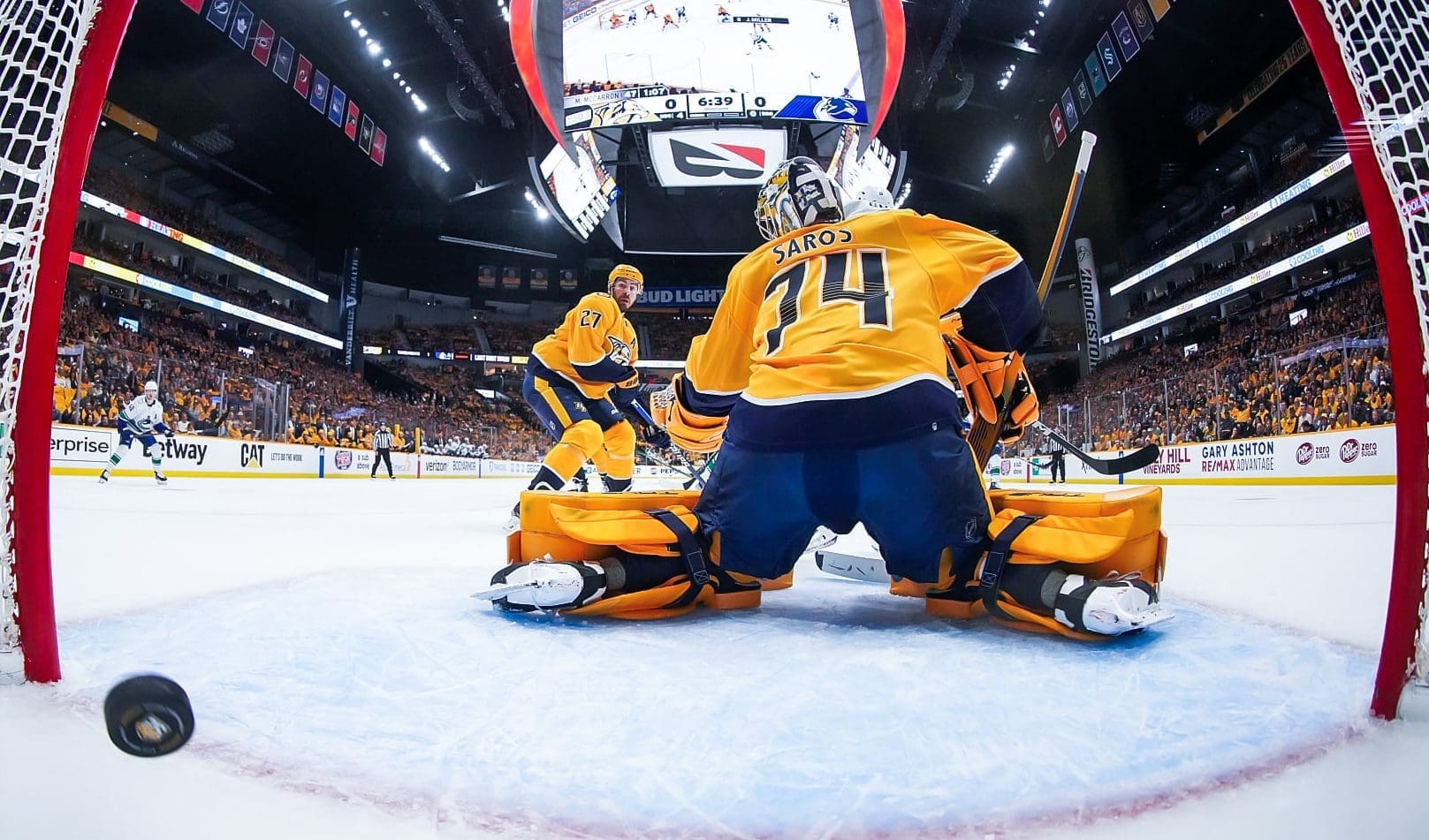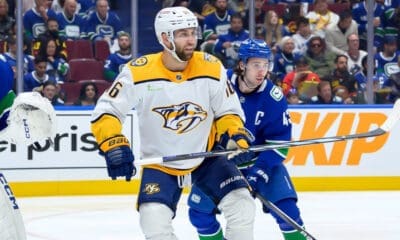Nashville Predators
Instant Reaction: Canucks Exposed The Predators’ Biggest Weaknesses

In Friday’s 1-0 Game 6 loss at Bridgestone Arena, the Vancouver Canucks exposed two of the Nashville Predators’ biggest flaws: a lack of depth scoring and an absentee power play.
The Predators had the most power-play opportunities of any team in the first round (22), yet they scored just twice on the man advantage (9.1%). Only the Los Angeles Kings and Toronto Maple Leafs scored fewer PP goals than they did.
It could be argued that the turning point in Friday’s Game 6 was the four-minute power play the Predators had in the second period but failed to capitalize on. They had just three shots on goal during that four-minute period, none of which were quality attempts.
After that penalty kill, it felt as if momentum started to shift to Vancouver’s side. No matter how many shots the Predators were throwing at the Canucks, they couldn’t generate quality chances and they couldn’t keep sustained pressure in the offensive zone.
Aside from their own power play woes, the Predators also struggled with whoever was in net. They lost to three different goaltenders. Third-string rookie Arturs Silov won two of his three starts against Nashville, including Friday’s decisive Game 6 in which he had a 28-save shutout, becoming the first rookie goaltender in Canucks history to record a series-clinching win.
In those three games, Silovs stifled Nashville’s offense, logging an .938 save percentage (he stopped 75 of 80 shots) and a 2.58 goals-against average, and he held the Predators to just 1.66 goals per game (they averaged 3.24 goals per game during the regular season).
And the kicker is, in those games Silovs started, the Predators bested Vancouver in shots (80 to 70), scoring chances for (74 to 69) and high-danger chances for (31 to 25), yet they couldn’t put the puck in the net.
But it wasn’t just Silovs who kept Nashville’s offense in check. Both Thatcher Demko, who started Game 1, and Casey DeSmith, who started Game 2 and Game 3, kept the Predators at bay as they struggled to get much past the bigger, more physical Canucks’ defense.
The Predators’ biggest scoring threats — Filip Forsberg, Roman Josi, Gustav Nyquist and Ryan O’Reilly — were M.I.A. for much of the series, and little help came from any of the team’s other lines.
In fact, the average scoring for all four players was down significantly from their regular-season output:
- Forsberg: 1.15 points per game during the regular season, 1.0 during the playoffs
- Nyquist: 0.93 points per game during the regular season, 0.67 during the playoffs
- Josi: 1.04 points per game during the regular season, 0.50 during the playoffs
- O’Reilly: 0.84 points per game during the regular season, 0.33 during the playoffs
The metrics for the Forsberg-O’Reilly-Nyquist line were not pretty. The trio had just three goals for and three goals against, they logged a 2.17 expected goals for, and they were bested in percentage of scoring chances for (45.16%), and they broke even in percentage of high-danger chances for (50%) and percentage of rebound attempts (50%).
And none of the Predators’ other three lines were any better.
The Cole Smith-Michael McCarron-Kiefer Sherwood line:
- 0 goals for, 1 goal against, 0.77 expected goals for, percentage of scoring chances (46.7%), percentage of high-danger chances for (23.08%), percentage of rebound attempts (25%)
The Jason Zucker-Colton Sissons-Anthony Beauvillier line:
- 1 goal for, 0 goals against, 0.85 expected goals for, percentage of scoring chances for (36%), percentage of high-danger chances for (45.45%), percentage of rebound attempts (40%)
The Mark Jankowski-Tommy Novak-Luke Evangelista line:
- 0 goals for, 0 goals against, 0.71 expected goals for, percentage of scoring chances for (46.6%), percentage of high-danger chances for (40%), percentage of rebounds for (50%)
Sure, there are plenty of positives the Predators can take from their playoff performance. Hell, they weren’t even supposed to see the postseason, much less take one of the top teams in the NHL to its limit.
But if there’s one lesson the Predators can learn from this series it’s that the team desperately needs another high-end scorer.
We’re not talking another 20-goal, 50-point Craig Smith type of player either. They need a true top-of-the-lineup 30-goal-plus, 75-point-plus caliber of player (think along the lines of Sam Reinhart or Jake Guentzel) so they don’t become a one- or two-line team.
Nashville’s offense is good enough to win one-off regular-season games against teams like the Winnipeg Jets and Florida Panthers, but it’s not set up to succeed in a seven-game series against a truly elite defensive team like the Canucks — one that excels at blocking shots, clogging shooting lanes and taking away time and space to shoot.
(All stats via Natural Stat Trick)
Follow Michael Gallagher on X/Twitter @MGsports_
Be sure to follow Nashville Hockey Now on X/Twitter, Facebook, YouTube and Instagram.















